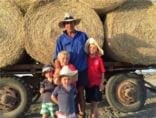
11 Oct Life on the Hay Plains and some Economic talk
Life on the Hay Plains: Rowan & Sarah Houston
By Charlotte Thomson
Recently, I talked to Rowan Houston of “Budgewah,” 20km’s from Hay in NSW. In the last few years, the Houston’s have expanded their portfolio of properties around Hay. Rowan is 4th generation farmer, who runs ‘Budgewah’ with his wife Sarah and 4 young boys.
How long has ‘Budgewah’ been in the family for?
“Back in 1888, my great grandfather selected the land that was the original ‘Budgewah’. Back then it was only 7500 hectares and the place only stocked merinos. I took over the property from my father back in 2000. We’ve made a couple of changes since then by slowly adding more land to our business and we now have 13,000 hectares total. I also switched from running Shorthorn cattle to Angus cattle as I believed the area was more suitable for breeding than fattening.”
Why have you expanded your property?
“I wanted more land to make it easier on the country and to run lighter numbers of stock over. I particularly wanted to look after the land because, just looking at the statistics, Hay averages a drought every 3 years. The national park next to us has gone the opposite way and they got rid of all the livestock on the place. Recently, the worst years were between 2000 and 2009. Although the park was looking good towards the start of the drought, by the end of it they were in the same condition as us because the kangaroos had stripped the place of grasses. There hasn’t been any culling of the kangaroos and so to stop them from eating all our pastures we are looking to build our fences higher and electrifying them.
You have 4 young boys (Jim, Archie, Harry and Bill) would you like them to be the 5th generation to take over the farm?
“They are keen on the farm at the moment and like to come and help me out about the place, but I won’t force them to go into it. I would want them to work for it, as I don’t believe people are given things for free. I would help them along the way but would want them to purchase it from me somehow. That’s where a lot of farming succession can go awry. There’s a belief that the first generation earns it, the second maintains it and the third loses it. I want to try and instil appreciation of the farm in the boys. They currently go to Hay Public School and over the next few years they’ll eventually head to boarding school.”
(Photos of Budgewah, Rowan and his four boys Jim, Archie, Harry and Bill)
Economic Tug of War
The global economy is expanding at a moderate pace, with some further softening in conditions in China and East Asia of late, but stronger US growth. Key commodity prices are much lower than a year ago, in part reflecting increased supply, including from Australia. Australia’s terms of trade are falling.
The Federal Reserve is expected to start increasing its policy rate over the period ahead, but some other major central banks are continuing to ease policy. Equity market volatility has continued, but the functioning of financial markets generally has not, to date, been impaired. Long-term borrowing rates for most sovereigns and creditworthy private borrowers remain remarkably low. Overall, global financial conditions remain very accommodative.
In Australia, the available information suggests that moderate expansion in the economy continues. While growth has been somewhat below longer-term averages for some time, it has been accompanied with somewhat stronger growth of employment and a steady rate of unemployment over the past year. Overall, the economy is likely to be operating with a degree of spare capacity for some time yet, with domestic inflationary pressures contained. Inflation is thus forecast to remain consistent with the target over the next one to two years, even with a lower exchange rate.
In such circumstances, monetary policy needs to be accommodative. Low interest rates are acting to support borrowing and spending. Credit is recording moderate growth overall, with growth in lending to the housing market broadly steady over recent months. Dwelling prices continue to rise strongly in Sydney and Melbourne, though trends have been more varied in a number of other cities. Regulatory measures are helping to contain risks that may arise from the housing market. In other asset markets, prices for commercial property have been supported by lower long-term interest rates, while equity prices have moved lower and been more volatile recently, in parallel with developments in global markets. The Australian dollar is adjusting to the significant declines in key commodity prices.
The RBA judged that leaving the cash rate unchanged was appropriate at this week’s meeting. Further information on economic and financial conditions to be received over the period ahead will inform the Board’s ongoing assessment of the outlook and hence whether the current stance of policy will most effectively foster sustainable growth and inflation consistent with the target.
(source: rba.gov.au)



Sorry, the comment form is closed at this time.